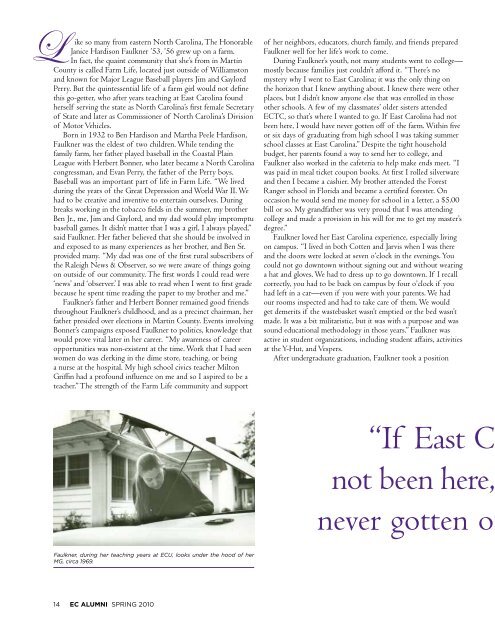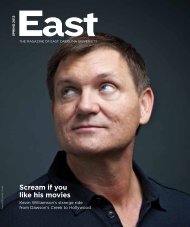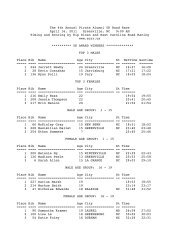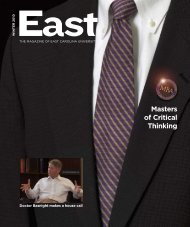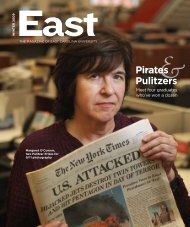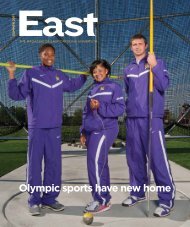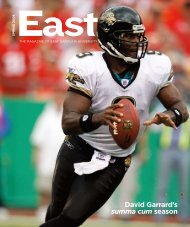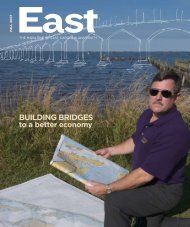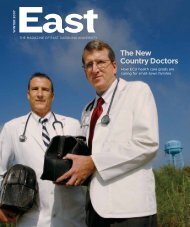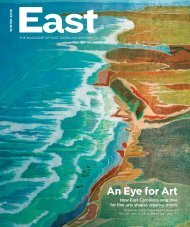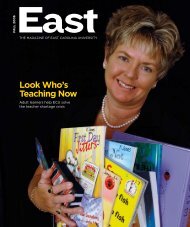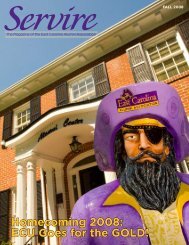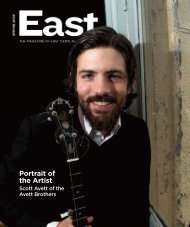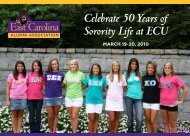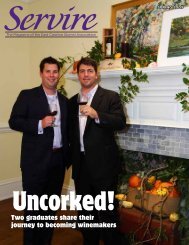Peter millar founder chris knott '87 is creating âa ... - PirateAlumni.com
Peter millar founder chris knott '87 is creating âa ... - PirateAlumni.com
Peter millar founder chris knott '87 is creating âa ... - PirateAlumni.com
You also want an ePaper? Increase the reach of your titles
YUMPU automatically turns print PDFs into web optimized ePapers that Google loves.
“If East Ca<br />
never gotten off<br />
L<br />
ike so many from eastern North Carolina, The Honorable<br />
Janice Hard<strong>is</strong>on Faulkner ’53, ’56 grew up on a farm.<br />
In fact, the quaint <strong>com</strong>munity that she’s from in Martin<br />
County <strong>is</strong> called Farm Life, located just outside of Williamston<br />
and known for Major League Baseball players Jim and Gaylord<br />
Perry. But the quintessential life of a farm girl would not define<br />
th<strong>is</strong> go-getter, who after years teaching at East Carolina found<br />
herself serving the state as North Carolina’s first female Secretary<br />
of State and later as Comm<strong>is</strong>sioner of North Carolina’s Div<strong>is</strong>ion<br />
of Motor Vehicles.<br />
Born in 1932 to Ben Hard<strong>is</strong>on and Martha Peele Hard<strong>is</strong>on,<br />
Faulkner was the eldest of two children. While tending the<br />
family farm, her father played baseball in the Coastal Plain<br />
League with Herbert Bonner, who later became a North Carolina<br />
congressman, and Evan Perry, the father of the Perry boys.<br />
Baseball was an important part of life in Farm Life. “We lived<br />
during the years of the Great Depression and World War II. We<br />
had to be creative and inventive to entertain ourselves. During<br />
breaks working in the tobacco fields in the summer, my brother<br />
Ben Jr., me, Jim and Gaylord, and my dad would play impromptu<br />
baseball games. It didn’t matter that I was a girl, I always played,”<br />
said Faulkner. Her father believed that she should be involved in<br />
and exposed to as many experiences as her brother, and Ben Sr.<br />
provided many. “My dad was one of the first rural subscribers of<br />
the Raleigh News & Observer, so we were aware of things going<br />
on outside of our <strong>com</strong>munity. The first words I could read were<br />
‘news’ and ‘observer.’ I was able to read when I went to first grade<br />
because he spent time reading the paper to my brother and me.”<br />
Faulkner’s father and Herbert Bonner remained good friends<br />
throughout Faulkner’s childhood, and as a precinct chairman, her<br />
father presided over elections in Martin County. Events involving<br />
Bonner’s campaigns exposed Faulkner to politics, knowledge that<br />
would prove vital later in her career. “My awareness of career<br />
opportunities was non-ex<strong>is</strong>tent at the time. Work that I had seen<br />
women do was clerking in the dime store, teaching, or being<br />
a nurse at the hospital. My high school civics teacher Milton<br />
Griffin had a profound influence on me and so I aspired to be a<br />
teacher.” The strength of the Farm Life <strong>com</strong>munity and support<br />
of her neighbors, educators, church family, and friends prepared<br />
Faulkner well for her life’s work to <strong>com</strong>e.<br />
During Faulkner’s youth, not many students went to college—<br />
mostly because families just couldn’t afford it. “There’s no<br />
mystery why I went to East Carolina; it was the only thing on<br />
the horizon that I knew anything about. I knew there were other<br />
places, but I didn’t know anyone else that was enrolled in those<br />
other schools. A few of my classmates’ older s<strong>is</strong>ters attended<br />
ECTC, so that’s where I wanted to go. If East Carolina had not<br />
been here, I would have never gotten off of the farm. Within five<br />
or six days of graduating from high school I was taking summer<br />
school classes at East Carolina.” Despite the tight household<br />
budget, her parents found a way to send her to college, and<br />
Faulkner also worked in the cafeteria to help make ends meet. “I<br />
was paid in meal ticket coupon books. At first I rolled silverware<br />
and then I became a cashier. My brother attended the Forest<br />
Ranger school in Florida and became a certified forester. On<br />
occasion he would send me money for school in a letter, a $5.00<br />
bill or so. My grandfather was very proud that I was attending<br />
college and made a prov<strong>is</strong>ion in h<strong>is</strong> will for me to get my master’s<br />
degree.”<br />
Faulkner loved her East Carolina experience, especially living<br />
on campus. “I lived in both Cotten and Jarv<strong>is</strong> when I was there<br />
and the doors were locked at seven o’clock in the evenings. You<br />
could not go downtown without signing out and without wearing<br />
a hat and gloves. We had to dress up to go downtown. If I recall<br />
correctly, you had to be back on campus by four o’clock if you<br />
had left in a car—even if you were with your parents. We had<br />
our rooms inspected and had to take care of them. We would<br />
get demerits if the wastebasket wasn’t emptied or the bed wasn’t<br />
made. It was a bit militar<strong>is</strong>tic, but it was with a purpose and was<br />
sound educational methodology in those years.” Faulkner was<br />
active in student organizations, including student affairs, activities<br />
at the Y-Hut, and Vespers.<br />
After undergraduate graduation, Faulkner took a position<br />
not been here,<br />
Faulkner, during her teaching years at ECU, looks under the hood of her<br />
MG, circa 1969.<br />
14 EC ALUMNI SPRING 2010


